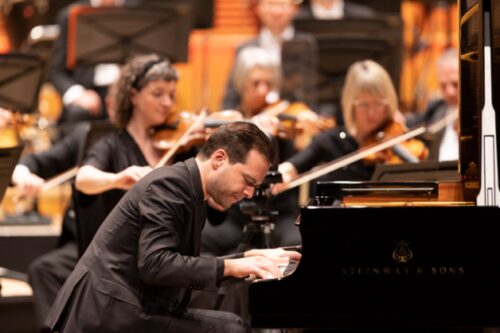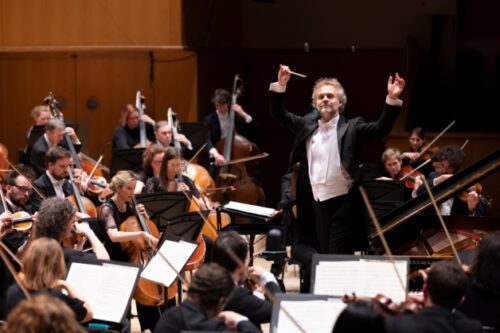 United Kingdom Robertson, Beethoven, Brahms: Francesco Piemontesi (pianist), Royal Scottish National Orchestra / Thomas Søndergård (conductor). Glasgow Royal Concert Hall, 28.1.2023. (GT)
United Kingdom Robertson, Beethoven, Brahms: Francesco Piemontesi (pianist), Royal Scottish National Orchestra / Thomas Søndergård (conductor). Glasgow Royal Concert Hall, 28.1.2023. (GT)

Lisa Robertson – am fìor-eun (world premiere)
Beethoven – Piano Concerto No.5 in E-flat major, Op.73 ‘Emperor’
Brahms – Symphony No.4 in E minor, Op.98
For this opening concert of 2023, it was good to see such a large audience for this attractively programmed concert before the ensemble leaves for their tour in February. The opening piece by the 30-year-old Lisa Robertson am fìor-eun means in Gaelic ‘true bird’ and it was the local sea eagles on the Sound of Mull which inspired her for this splendidly written orchestral work. The golden eagle and the sea eagle compete for existence in the Western Isles and in recent years are threatened again by extinction.
‘I greatly admire our local eagles, particularly the characteristically introverted golden eagles. They have fantastic 340-degree vision and a telescopic magnifier, seeing five times further than us and in five vivid colours. They are nature in perfect balance; masters of the airspace, with perfectly controlled flight modes, including free-falling, power-climbing, corkscrewing, sky-dancing and 200mph dive-bombing. The piece reflects these, while switching focus with five simultaneous, vibrantly coloured rhythms, imitating a hovering eagle’s perception of the landscape.’ The composer introduced her short piece to the audience by saying that her music invokes the flying patterns of the eagles, ‘the eagle flying across the orchestra from left to right and during the central section the eagle dive bombs the orchestra!’
The piece opened softly with the strings playing long slides creating a rather eerie picture of the Western Isles as the woodwind imitated bird calls in a chilling yet atmospheric sound picture. It was a lovely orchestrally tinted picture, and one wants to hear it again – like other pieces in the series of the RSNO Composers’ Hub – it would be excellent for the orchestra to take it on tour as ‘Scottish Postcards’ in sound.
In recent seasons, this orchestra have been superlative in their revelatory performances of Beethoven’s symphonies. In this the most symphonic of concertos, Thomas Søndergård took care in the ‘Emperor’ Concerto to present an authentic sound picture by positioning the natural timpani among the orchestra, next to the cellos, with the violin groups on the left and the violas on the right. The ‘Emperor’ opened stirringly with the soloist Francesco Piemontesi proclaiming opulently glittering chords and following a dramatic re-entry by the orchestra, a highlight was a beautiful passage from Katherine Bryan on the flute, enhanced as the idea was picked up gloriously by the horns.
Piemontesi exhibited exquisite piano technique, but I briefly thought the orchestra a little loud against his keyboard playing. His cadenza was beautiful and elegant and after the great climax, applause broke out – a feature perhaps of a more youthful audience. Søndergård took time for the applause to settle and find the right mood before the slow movement, and he conjured a deeply affecting passage on the strings accompanied by poignantly luminous keyboard playing. As the orchestra introduced a semitone at the beginning of the finale, the mood transformed dynamically with sublime playing from the Swiss-born musician and tremendously powerful orchestral playing, Søndergård conjured an exuberant joyous culmination for this glorious concerto.

The Fourth is the first in a cycle of all the Brahms symphonies to be performed this season. The opening Allegro non troppo started on the strings with an opulent warmth, vividly enhanced by the woodwind with notable solo contributions from Bryan on the flute, Adrian Wilson on the oboe, and Christopher Gough on the horn. In the second movement (Andante moderato) the Danish conductor was blessed by his musicians’ intensely beautiful playing, adorned by delightfully nuanced strings and an exquisitely eloquent solo passage from the clarinet of Timothy Orpen. The third movement (Allegro giocoso) opened with a vivid burst of exuberant harmonies, with the timpani, brass, percussion and whole orchestra enjoying this expression of all the charming joys of life. In the finale (Allegro energetico e passionato) there followed a glorious set of variations, bejewelled by Bryan’s flute, Wilson’s oboe and the brass group before the energetic close.
This is the last concert at the Royal Concert Hall before it undergoes several weeks of renovation – the first since it was opened in October 1990. Forthcoming concerts will be at the orchestra’s former home, the City Halls at Candleriggs which is currently the home of the BBC SSO and the Scottish Chamber Orchestra.
Gregor Tassie
